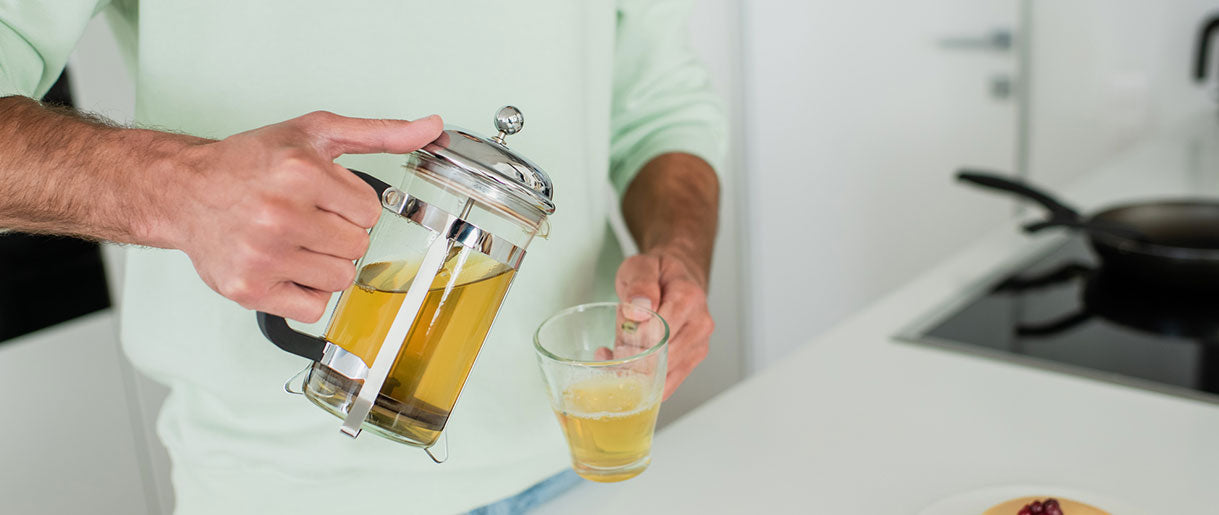Turkey tail tea is a herbal drink from the turkey tail mushroom, scientifically known as Trametes versicolor. This mushroom, notable for its colorful, fan-like appearance, has been used in traditional medicine across various cultures for centuries. The tea is made by boiling dried turkey tail mushrooms, sometimes in combination with other herbs, resulting in a mild, earthy-flavored brew.
The tea is highly regarded for its potential health benefits, including boosting the immune system, supporting gut health, and exhibiting potential anti-cancer properties due to its rich content of bioactive compounds such as polysaccharopeptides. However, as with any dietary supplement, it's essential to consult a healthcare professional before regular consumption.
This article aims to delve deeper into the world of turkey tail mushroom tea. This guide will offer comprehensive insights from understanding the mushroom's place in traditional medicine to the science behind its health benefits and how to brew it at home. Whether you're an experienced herbal tea drinker or just starting to explore, we aim to provide you with a robust understanding of this potent brew.
The Ancient Wonders: Mushrooms in Traditional Medicine

Historically, mushrooms have played a significant role in traditional medicine, especially in Asian cultures. Some records dating back to ancient China and Japan indicate the use of mushrooms for their medicinal properties, often linked with longevity and improved health. Among these revered fungi, turkey tail mushrooms were celebrated for their incredible benefits.
Medicinal Mushrooms: Nature's Healers
The concept of medicinal mushrooms goes beyond just turkey tail mushrooms. Several other varieties of mushrooms are known for their health benefits. Shiitake mushrooms, for instance, have anti-inflammatory and anti-cancer properties, while Reishi mushrooms are recognized for their potential to enhance immune function. Chaga mushrooms, another example, are rich in antioxidants, contributing to overall health.
Unraveling the Beauty: Description and Unique Features of the Turkey Tail Mushroom

The turkey tail mushroom, a key ingredient in turkey tail mushroom tea, is one of the most recognizable mushrooms due to its unique and visually appealing features. This fungus earns its name from its colorful palette and layered growth, strikingly similar to a turkey's tail. When dehydrated, turkey tail mushrooms can brew a soothing and healthful cup of mushroom tea.
Culture and Healing: Turkey Tail Mushroom in Traditional Medicine
Across various cultures, the turkey tail mushroom has been highly esteemed in traditional medicine practices. In Chinese medicine, it's known as "yun zhi," while in Japan, it's called "kawaratake," both referencing the mushroom's ability to boost health and longevity. These nutritious turkey tail mushrooms have been transformed into turkey tail mushroom tea for centuries, providing various health benefits.
A Deep Dive into the Science: Trametes Versicolor and its Bioactive Compounds
Scientifically known as Trametes versicolor, the turkey tail mushroom is a treasure trove of potent bioactive compounds. Among these, polysaccharopeptide (PSP) and polysaccharide-K (PSK) are notable for their potential to stimulate immune response.
Furthermore, turkey tail mushrooms are rich in beta-glucans, a dietary fiber known for its immune-boosting and cholesterol-lowering properties. When you sip on a cup of turkey tail tea, you're partaking in a brew rich in these beneficial compounds.
Brewing Delight: Step-by-Step Guide on How to Make Turkey Tail Tea

Creating a soothing cup of turkey tail mushroom tea at home can be a simple, rewarding process. Whether you're using turkey tail mushroom powder or whole dried mushrooms, the basics of how to make turkey tail tea are similar. Here's a turkey tail tea recipe:
Ingredients
- 1 cup of water per serving (you can increase the amount depending on the number of servings you would like to prepare).
- 2 grams of Turkey tail mushroom powder per 1 cup of water (per serving).
- Optional ingredients: A cup of dairy or non-dairy milk, ginger, lemon, cinnamon, and honey (to taste)
Instructions to Make 4 Servings
1. Begin with a teaspoon of turkey tail mushroom powder or a handful of dried turkey tail mushrooms.
2. In a large pot, bring 4 cups of water to a boil.
3. Add the turkey tail mushroom powder or the dried mushrooms to the boiling water, then lower the heat to a simmer.
4. Let it simmer for about 1 hour for a richer flavor.
5. Strain the tea into a large mug, add honey or maple syrup for a lightly sweetened, delicious blend, and enjoy!
Innovative Blends: Diverse Turkey Tail Tea Recipes
Recipe #1
How to make turkey tail tea doesn't end at the basic recipe. There are several delicious blends you can create to vary your daily routine. Here's a turkey tail tea recipe with a refreshing twist:
1. Prepare the turkey tail tea base using turkey tail mushroom powder or dried mushrooms as previously described.
2. Add a slice of lemon, a dash of cinnamon, and a slice of fresh ginger to the pot while simmering for a refreshing, spiced blend.
3. After straining, consider adding milk for a creamy version of your turkey tail mushroom tea.
Recipe #2
A lightly sweetened turkey tail tea recipe with a hint of natural roasted maple flavor might include:
1. Follow the initial steps of making tea.
2. Add a spoonful of roasted chicory and a dash of toasted maple syrup while simmering.
3. After straining, add a slice of lemon for a hint of citrus.
Instructions For Using A Tea Infuser:
1. Bring water to a boil in a teapot, kettle, or saucepan.
2. Put some Turkey tail mushroom powder in a tea infuser, pour hot water over it, or whisk it right into the water.
3. Give the tea five minutes to steep (or more for a more robust flavor).
4. Pour the mix into a mug and then sip.
Instructions For Using The French Press:
1. Bring water to a boil in a teapot, kettle, or saucepan.
2. The bottom of your French press should contain 2 grams of the mushroom tea mixture in each serving.
3. Just cover the dry mushroom mixture with hot water while stirring. Give the tea in the French press for at least five minutes to steep.
4. After that, pour the remaining hot water over the mixture.
5. After blending thoroughly and covering the French press with a lid, carefully lower the plunger after a few more minutes of steeping.
6. Pour the mixture into a cup and then sip.
Sourcing and Storing: Choosing Quality Turkey Tail Mushrooms and Tea Storage Tips
When making turkey tail mushroom tea, choosing quality mushrooms is crucial. Look for certified organic turkey tail mushrooms, preferably from a reputable supplier that ensures the use of the Trametes versicolor fruiting body, not just the mushroom mycelium.
For a more potent brew, opt for turkey tail mushroom powder. The powder form ensures a richer extraction of the beneficial compounds, making your turkey tail tea even more potent.
Keep your dried mushrooms or turkey tail mushroom powder in an airtight container in a cool, dark place. This will help to maintain their potency over time. The brewed tea can be refrigerated and enjoyed within a week. Consider freezing the tea in ice cube trays for a quick and convenient addition to your daily routine.
A Natural Health Boost: Turkey Tail Tea Benefits

1. A Healthful Cup: Boosting Immune System with Turkey Tail Tea
One of the most renowned benefits of drinking soothing turkey tail tea is its potential to enhance the immune system(1). This is primarily attributed to bioactive compounds such as beta-glucans in the turkey tail mushroom extract. Whether you enjoy it as loose-leaf tea or use tea bags, incorporating turkey tail mushroom tea into your routine can help support your body's natural defenses.
2. Harnessing Nature's Power: Potential Anti-Cancer Properties of Turkey Tail
Turkey tail mushroom tea is also gaining recognition for its potential anti-cancer properties. Several studies suggest(2) that compounds in the turkey tail extract, particularly polysaccharide-K (PSK), might have the ability to inhibit the growth of certain types of cancer cells.
While more extensive research is required, the current findings are promising and reinforce the potency of these powerful mushrooms. These results suggest that turkey tail could effectively treat cancer when combined with conventional treatments.
3. Tending the Gut: Promoting Digestive Health with Turkey Tail Tea
In addition to the immune and potential anti-cancer benefits, turkey tail for gut health is another topic of interest(3). The turkey tail mushroom has prebiotic properties, which can help nourish the healthy bacteria in the gut, thus improving digestive health. So whether you like your tea steeped in a tea infuser or prefer the convenience of a tea bag, sipping on turkey tail mushroom tea could be a great way to support your gut health.
4. Beyond the Common: Other Possible Health Benefits of Turkey Tail Tea
While the immune-boosting, anti-cancer, and gut health benefits are often highlighted, there's more to turkey tail mushroom tea. It's suggested that the compounds in turkey tail may help lower inflammation, making it a beneficial brew for individuals with inflammatory conditions. Furthermore, some preliminary studies indicate potential benefits related to cognitive health, although more research is needed in this area.
Getting Creative: Improving the Taste of Turkey Tail Mushroom Tea

Savor the Flavor: Turkey Tail Tea Taste Profile
Brewed turkey tail mushroom tea has a unique, earthy taste profile. Its flavor can be described as woodsy and mildly sweet, with a comforting, mushroom-like richness.
The slow extraction process brings out the best of this rich flavor when brewed in a French press or tea pot. However, you can enjoy the tea alone or enhance the turkey tail mushroom taste by adding a touch of lemon, cinnamon, or sweeteners like honey. This brings a delightful contrast to the tea's earthiness, making each sip a pleasure.
The Art of Serving: How to Serve and Drink Turkey Tail Tea
Serving turkey tail mushroom tea can be as simple or sophisticated as you'd like. For the best brew, steep your tea in a French press for 15 minutes. This method maximizes the extraction of beneficial compounds from the mushrooms.
If you're using regular tea bags, a five-minute steep in hot water should suffice. Turkey tail mushroom tea can be enjoyed hot, straight out of the press, or cooled down as a refreshing iced tea. You can add honey, a splash of non-dairy milk, or even a dash of Astragalus propinquus extract to complement its earthy flavor.
Perfect Pairings: Complementary Food and Drinks
Turkey tail tea's unique flavor profile pairs well with various foods and beverages. You might enjoy your brew alongside lightly sweetened pastries or biscuits for morning or afternoon tea. The earthy, mild flavor of the tea can perfectly balance out the sweetness of these treats.
As a hot beverage, turkey tail mushroom tea, and hearty, savory meals are comforting. Think stews, roasted vegetables, or even stir-fries. The tea's flavor can also complement other warm, aromatic beverages. Try sipping on your turkey tail tea after a cup of chicory root or carob pods tea for a multi-layered tasting experience.
Finally, adding spices like cinnamon or a squeeze of lemon can help elevate the flavor of the tea and make it taste great on its own or with your favorite meals. With these suggestions, every cup of turkey tail tea can become a memorable part of your daily rituals.
Safety First: Possible Side Effects of Consuming Turkey Tail Tea

While turkey tail mushroom tea is generally considered safe for consumption, it's essential to be aware of the potential side effects of mushroom supplements. Some individuals might experience digestive discomfort, including bloating, gas, or changes in bowel movements after consuming turkey tail mushroom tea. These side effects are generally mild and temporary, but listening to your body and adjusting your consumption is crucial.
A Cup of Caution: Who Should Avoid Drinking Turkey Tail Tea
Turkey tail mushroom tea, while beneficial to many, might not be suitable for everyone. Individuals with mushroom allergies or intolerances should avoid the tea due to its fungal origins.
Furthermore, people with immune disorders, or those who are pregnant, nursing, or on specific medications, should consult their healthcare professional. This ensures the tea does not interfere with their medical condition or medication efficacy.
Turkey Tail Tea
FAQs About Turkey Tail Tea
What Is The Best Time Of Day To Drink Turkey Tail Tea?
The best time to drink turkey tail mushroom tea can vary depending on your preferences and reasons for drinking it. Some people prefer to consume it in the morning for an immune-boosting start to their day, while others might enjoy it in the evening as part of their winding down routine.
Since turkey tail mushroom tea is naturally caffeine-free, it can be enjoyed anytime without impacting your sleep. However, if you drink it for specific health purposes, it's best to consult a healthcare provider for personalized advice.
Can I Drink Turkey Tail Tea Every Day?
Yes, you can drink turkey tail tea every day. Regular consumption is often recommended to benefit from its potential immune-boosting properties fully. However, as with any dietary supplement, listening to your body and adjusting your intake as necessary is essential.
If you're new to turkey tail mushroom tea, you might want to start with a small amount and gradually increase your consumption to see how your body reacts. Always consult a healthcare professional before starting any new dietary regimen, especially if you have underlying health conditions or are taking any medications.
Does Turkey Tail Tea Have Caffeine?
No, turkey tail tea does not contain caffeine. Turkey tail mushrooms, like all other mushrooms, are naturally caffeine-free.
This makes turkey tail tea an excellent option for those sensitive to caffeine or who prefer to limit their caffeine intake. It can be enjoyed at any time of the day, even before bed, without worrying about the potential sleep-disrupting effects of caffeine.
Key Takeaways
Turkey tail tea is a unique beverage harnessing the power of one of the most renowned medicinal mushrooms. This soothing brew brings potential benefits like immune system support, potential anti-cancer properties, and gut health promotion.
The story of turkey tail mushroom tea is an excellent introduction to the fascinating world of medicinal mushrooms. As we've seen, these functional fungi can potentially boost our health in various ways. But turkey tail is just the beginning. A whole world of medicinal mushrooms is out there waiting to be explored—each with its unique potential health benefits and applications. Let this deep dive into turkey tail tea inspire you to explore this intriguing, natural world further.
In conclusion, turkey tail tea is more than just a drink; it's a testament to how nature can contribute to our overall health and well-being. But the beauty of this journey lies in individual experiences. Have you tried turkey tail tea before? If so, how has it affected your life and well-being? If you're just getting started, what are your hopes and expectations?
We invite you to share your experiences and thoughts. Each of us has a unique story to tell, and by sharing, we add another layer of richness to the narrative of turkey tail tea. So, let's steep together in this communal brew of shared wisdom and experiences.
References
- The mycelium of theTrametes versicolor (Turkey tail) mushroom and its fermented substrate each show potent and complementary immune activating properties in vitro, (1)https://www.ncbi.nlm.nih.gov/pmc/articles/PMC6889544/
- Trametes versicolor (Turkey Tail Mushrooms) and the Treatment of Breast Cancer, (2)https://www.ncbi.nlm.nih.gov/pmc/articles/PMC4890100/
- Effects of polysaccharopeptide from Trametes versicolor and amoxicillin on the gut microbiome of healthy volunteers: a randomized clinical trial, (3)https://pubmed.ncbi.nlm.nih.gov/25006989/









Let Us Know Your Comments